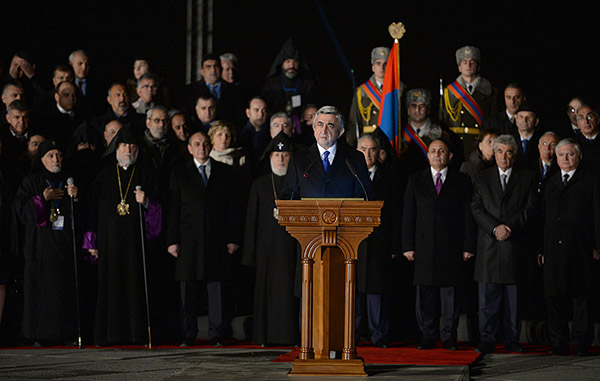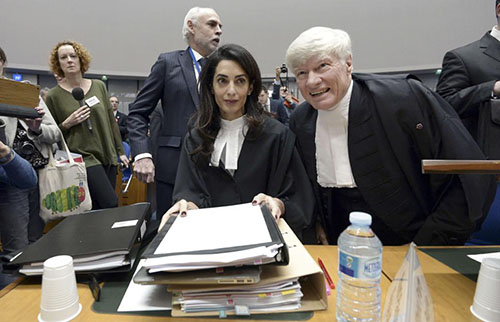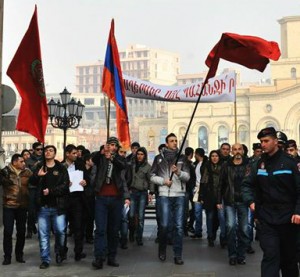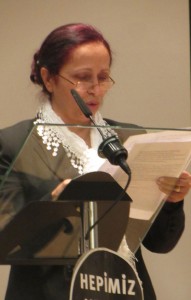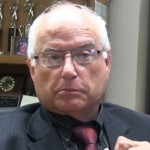By Sona Zeitlian
The first major conference in Los Angeles, which marked the centennial of the Armenian Genocide, was presented by the first ever organized Armenian Women’s Coalition of Los Angeles, the group of thirteen women’s associations. The event took place on Saturday, January 17, 20015 at Woodbury University’s Fletcher Jones Auditorium.
The formation of a women’s coalition was initiated by AGBU Hye Geen Founder and President Sona Yacoubian as a fitting, all-inclusive tribute to the centennial celebration of the Armenian Genocide. With “the pledge to cooperate in carrying a brighter torch for the future of the Armenian people,†the concerted efforts of the coalition representatives, all consistently well-planned and efficiently executed, the result was a highly commendable, groundbreaking conference.
The morning session began with the welcoming remarks of Dr. H. Eric Schockman, the University’s Chair of Organizational Leadership. He expressed his admiration for the resilient Armenian women who had remained strong in the face of adversity. He also cited the example of Aurora Mardiganian, a genocide survivor, who had her narrative filmed and actually had an acting role in Ravished Armenia.
This was followed by the music of Gomidas, one of the intellectuals and prominent community figures arrested on April 24, 1915, the initial phase of the planned Genocide. The moving music was played by the Enlightenment String Quartet of Marina Manukian, Sarkis and Susanna Gyurgchyan and Garik Terzian.
AGBU Hye Geen Founder and President Sona Yacoubian delivered the message of the day. She highlighted the role of Armenian women in the regeneration of the nation by closing ranks, not only to care for the needs of thousands of mostly women refugees and orphans, but also to transmit the national heritage. It was time to show that “With integrity, intelligence, maturity and dedication, the Armenian Women’s Coalition of Los Angeles silenced all doubts by recognizing unity as the cornerstone of their success.â€
After an interlude of spiritual support and prayer by delegates from the Diocese and the Prelacy, headed by Archpriest Rev. Zaven Arzoumanian, Alidz Aghbabiab stepped to the podium. A professional story-teller, author and publisher of bilingual children’s books, she narrated a “hekiat,†or tales of her mother, with the help of the impressive black and white photography of Vartan Derounian, and with the interjection of songs and quotes repeated after her by the audience. They were all stories about the hardships of dispersal, loss and poverty, yet about an indomitable spirit to overcome and survive as a nation.
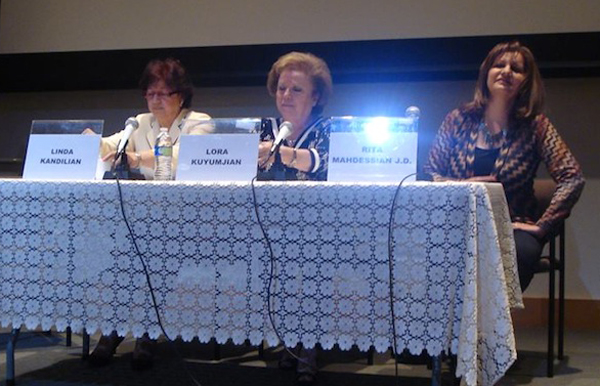 The first panel discussion in Armenian, entitled “Armenian Women’s Leadership and Service in the post-Genocide Period and During Regeneration,†was moderated by Lucineh Nalbandian, a practicing physician in the earthquake zone in Armenia and now co-host of the popular AGBU Hye Geen TV program.
The first panel discussion in Armenian, entitled “Armenian Women’s Leadership and Service in the post-Genocide Period and During Regeneration,†was moderated by Lucineh Nalbandian, a practicing physician in the earthquake zone in Armenia and now co-host of the popular AGBU Hye Geen TV program.
The first discussant was Linda Kandilian, head of the Armenian Department of the Armenian Sisters’ Academy and a dedicated executive member of the Armenian Relief Society. Her topic being memories of women Genocide survivors, she centered her presentation on the inspiring narrative of Manoushag Zartarian. Exiled from Kharpert, she and some others were abducted by Arab tribesmen and had to endure forced islamization for sheer life. She was finally rescued by missionaries and restored to her people. During her ordeal, she held fast to her faith and never lost hope of reunion with her own.
The second discussant was Lora Kuyumjian, an award winning educator and a valued teacher at the AGBU Vatche and Tamar Manougian High School. Her topic was “Integration of women and children into the Armenian community.†She described how women made use of their scant resources to protect and provide for their children and to preserve their Christian identity. With the breakdown of traditional roles, women proved to be adaptable at rebuilding their lives, looking for ways to earn a livelihood, locating dispersed family members as well as kith and kin, and sparing no efforts to restart communal life. In time women succeeded in achieving remarkable results, attaining leadership positions in personal and public domains, including the pursuit of the National Cause.
The third discussant was Rita Mahdessian, a practicing lawyer and active in community affairs. Her subject was “Strategies of survival to surmount Genocide.†She recalled the determination of women to break the cycle of starvation and hardships to attain a new way of life. Trying to forge unity of ranks, they also tried to transmit their language and culture to the next generation. She contrasted these women with those who were forcibly Islamized and had to endure a life of shame and suppressed rage.
After lunch break, the conference reconvened for a presentation by Bared Maronian, author of the documentary “Orphans of the Genocide,†which has won multiple awards. He is now in the process of preparing a new documentary entitled “Women of 1915.†He began by showing a clip featuring Mae Derdarian retelling the story of Vergeen, a Genocide survivor. He also emphasized the resilience of Armenian women by citing examples from early history to the battles of self defense in Western Armenia.
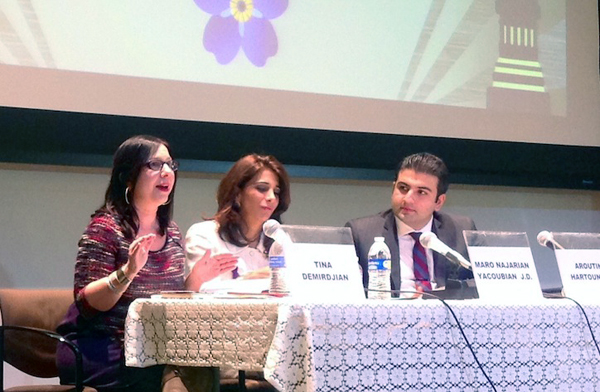 The second panel discussion, this time in English, was entitled “New avenues of diaspora existence†and was moderated by Tamar Poladian, an experienced lawyer with a focus on domestic violence, a certified law instructor and Minors’ Counsel. Before introducing the discussants, she observed, “We have risen like the mythical phoenix from the ashes of destruction to meet the new challenges of the diaspora and to seek new avenues for survival.â€
The second panel discussion, this time in English, was entitled “New avenues of diaspora existence†and was moderated by Tamar Poladian, an experienced lawyer with a focus on domestic violence, a certified law instructor and Minors’ Counsel. Before introducing the discussants, she observed, “We have risen like the mythical phoenix from the ashes of destruction to meet the new challenges of the diaspora and to seek new avenues for survival.â€
The first discussant, Tina Demirdjian spoke about “Integrating youth into family life.†She is a published poet, a teacher of poetry and has directed the Armenian Dress and Textile project to bridge the past with the present, using clothing originally belonging to her family. She read from her works to elaborate the need of making connections between the narratives of ancestors and their modern descendants. To that end, she made frequent references to dresses and the traditional fine needlework of her family displayed on the stage.
The second discussant, Maro Najarian-Yacoubian, a lawyer serving as the city of Glendale’s Transportation and Parking Commissioner as well as an active participant in Armenian community organizations spoke about “Securing the Armenian heritage in the digital age.†Referring to the new generation of Armenians as adept in technological innovations, she urged to pool resources, citing the example of the AGBU Virtual College initiative of Yervant Zorian, connecting teachers and students throughout the community. She also specified the fact that securing archival materials, such as rare copies of prominent newspapers dating back to 1895-1896 and digitizing them, can be useful in a social media campaign of awareness. In the same context, she mentioned the American Red Cross founder Clara Barton’s book about the Hamidian massacres to be digitized and made available on the internet. Together with the narratives of survivors of the Genocide, these can “secure and enhance our heritage.â€
The final discussant was Aroutin Hartounian, involved in volunteerism among Armenian youth and President of Unified Young Armenians, also serving on the Glendale Police Department’s Community partnership Advisory Committee as well as the United Armenian Council of Los Angeles. He spoke purposefully about activism in civil society as a means to pass on the torch to a new generation in pursuit of national goals. He stressed the importance of remaining relevant, of recruiting and retaining Armenian youth, maintaining the national identity, and improving the capacity of the diaspora to uphold the national well being.
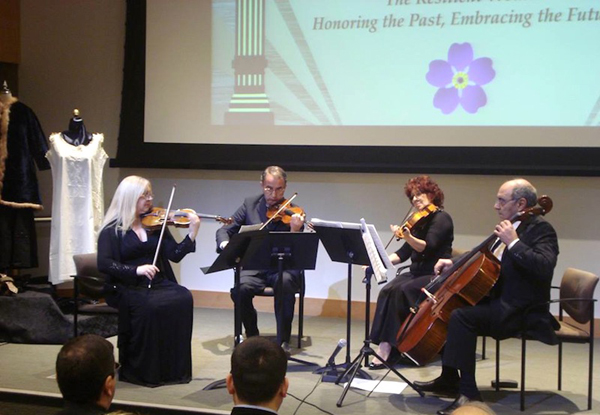 Having run out of the question/comment time, the conference ended with the beautifully executed solo dance of Sona Gevorkian, a professional dancer, choreographer and dance instructor. Her dance was a graceful and memorable final act of a singular and most informative conference. The audience lingered to review once again the meaningful exhibits and made sure to keep the conference booklet, compiled with utmost care, with a front cover headed by the coalition’s effective logo by Manuella, an AGBU HYE Geen member, and a back cover montage of famous women’s portraits, each with a narrative of her own.
Having run out of the question/comment time, the conference ended with the beautifully executed solo dance of Sona Gevorkian, a professional dancer, choreographer and dance instructor. Her dance was a graceful and memorable final act of a singular and most informative conference. The audience lingered to review once again the meaningful exhibits and made sure to keep the conference booklet, compiled with utmost care, with a front cover headed by the coalition’s effective logo by Manuella, an AGBU HYE Geen member, and a back cover montage of famous women’s portraits, each with a narrative of her own.
The Armenian Women’s Coalition of Los Angeles made an impressive debut. It is hoped the initiative will endure and contribute to the further advancement of Armenian women.
A Groundbreaking Conference “The Resilient Women: Honoring the Past, Embracing the Futureâ€

